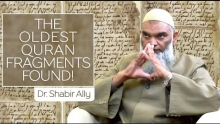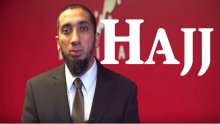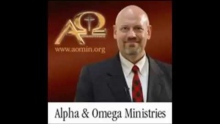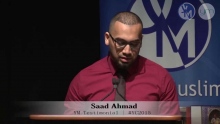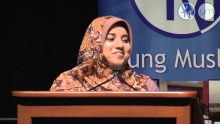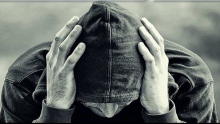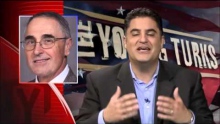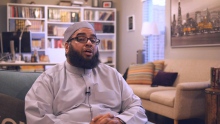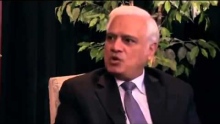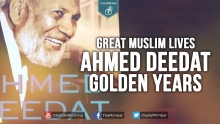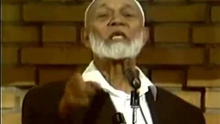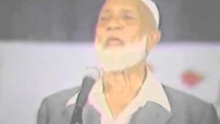Late Sheikh Ahmed Deedat challenges James White to prove that Jesus is God
10 years ago
10:54
4,788 views
Late Sheikh Ahmed Deedat challenges James White to quote a verse from the Bible in which Jesus says " I'm God " or " worship me "
----------------------------------------------
Ahmed Deedat was born in the town of Tadkeshwar, Surat District, Gujarat, India in 1918. His father had emigrated to South Africa shortly after the birth of Ahmed Deedat. At the age of 9, Deedat left India to join his father in what is now known as Kwazulu-Natal. His mother died only a few months after his departure. Arriving in South Africa, Deedat applied himself with diligence to his studies, overcoming the language barrier and excelling in school, even getting promoted until he completed standard 6. However, due to financial circumstances, he had to quit school and start working by the time he was the age of 16.
In 1936, while working as a furniture salesman, he came across a group of missionaries at a Christian seminary on the Natal South Coast. The missionaries in their efforts to convert people of Muslim faith, would often accuse the Islamic Prophet Muhammad of having "used the sword" to bring people to Islam. Such accusations seemed to offend Deedat and were to form a major influence on Deedat's subsequent interest in comparative religion.
Deedat took a more active interest in religious debate after he came across a book entitled "Izhar ul-Huqq" (Truth Revealed), written by Rahmatullah Kairanawi, found while he was rummaging for reading material in his employer's basement. This book chronicled the efforts of Christian missionaries in India from a century earlier. The book had a profound effect on Deedat and led to the purchase of his first Bible and holding of debates and discussions with trainee missionaries, whose questions he had previously been unable to answer.
His foray into Bible Studies took a more serious turn when he started attending Islamic study classes held by a local Muslim convert named Mr. Fairfax. Seeing the popularity of the classes, Mr. Fairfax offered to teach an extra session on the Bible and how to preach to Christians about Islam.[4] Deedat and a few others were delighted at the opportunity. However, only a few months into the project, Mr. Fairfax had to pull out of his engagement, and Deedat, who was by this point quite knowledgeable about the Bible, took over teaching the class. Which he did for three whole years thereafter and later credited for expanding his horizons significantly towards missionary work.
Early Missionary Work 1942--1956
Deedat's first lecture, entitled "Muhammad: Messenger of Peace", was delivered in 1942 to an audience of fifteen people at a Durban movie theatre named Avalon Cinema.[5] Over time, Deedat's popularity as a public speaker grew in Durban, to the point that he was invited to speak in other cities in South Africa. A decade later he was filling City halls with audiences numbering in the thousands in cities such as Johannesburg and Cape Town.
A major vehicle of Deedat's early missionary activity was the 'Guided Tours' of the Jumma Mosque in Durban. The vast ornamental Jumma Mosque was a landmark site in the tourist friendly city of Durban. A sophisticated program of luncheons, speeches and free hand-outs was created to give an increasingly large number of international tourists often their first look at Islam. Deedat himself featured as one of the guides, hosting tourists and giving succinct introductions to the Islamic Religion and the relationship between Islam and Christianity.
IPCI and as-Salaam 1956--1986
By 1956, missionary work in the form of frequent public speaking engagements and the popular guided tours of the Jumma Masjid had begun to pay dividends. Enquiries about Islam from the general public in South Africa had started to pour in at an increasing rate. Soon it became apparent that working from the mosque office was not going to be sufficient to handle the demand for literature and to facilitate an increasing number of people showing more than simply tourist level interest in Islam.
Among Deedat's close friends were Goolam Hoosein Vanker and Taahir Rasool
----------------------------------------------
Ahmed Deedat was born in the town of Tadkeshwar, Surat District, Gujarat, India in 1918. His father had emigrated to South Africa shortly after the birth of Ahmed Deedat. At the age of 9, Deedat left India to join his father in what is now known as Kwazulu-Natal. His mother died only a few months after his departure. Arriving in South Africa, Deedat applied himself with diligence to his studies, overcoming the language barrier and excelling in school, even getting promoted until he completed standard 6. However, due to financial circumstances, he had to quit school and start working by the time he was the age of 16.
In 1936, while working as a furniture salesman, he came across a group of missionaries at a Christian seminary on the Natal South Coast. The missionaries in their efforts to convert people of Muslim faith, would often accuse the Islamic Prophet Muhammad of having "used the sword" to bring people to Islam. Such accusations seemed to offend Deedat and were to form a major influence on Deedat's subsequent interest in comparative religion.
Deedat took a more active interest in religious debate after he came across a book entitled "Izhar ul-Huqq" (Truth Revealed), written by Rahmatullah Kairanawi, found while he was rummaging for reading material in his employer's basement. This book chronicled the efforts of Christian missionaries in India from a century earlier. The book had a profound effect on Deedat and led to the purchase of his first Bible and holding of debates and discussions with trainee missionaries, whose questions he had previously been unable to answer.
His foray into Bible Studies took a more serious turn when he started attending Islamic study classes held by a local Muslim convert named Mr. Fairfax. Seeing the popularity of the classes, Mr. Fairfax offered to teach an extra session on the Bible and how to preach to Christians about Islam.[4] Deedat and a few others were delighted at the opportunity. However, only a few months into the project, Mr. Fairfax had to pull out of his engagement, and Deedat, who was by this point quite knowledgeable about the Bible, took over teaching the class. Which he did for three whole years thereafter and later credited for expanding his horizons significantly towards missionary work.
Early Missionary Work 1942--1956
Deedat's first lecture, entitled "Muhammad: Messenger of Peace", was delivered in 1942 to an audience of fifteen people at a Durban movie theatre named Avalon Cinema.[5] Over time, Deedat's popularity as a public speaker grew in Durban, to the point that he was invited to speak in other cities in South Africa. A decade later he was filling City halls with audiences numbering in the thousands in cities such as Johannesburg and Cape Town.
A major vehicle of Deedat's early missionary activity was the 'Guided Tours' of the Jumma Mosque in Durban. The vast ornamental Jumma Mosque was a landmark site in the tourist friendly city of Durban. A sophisticated program of luncheons, speeches and free hand-outs was created to give an increasingly large number of international tourists often their first look at Islam. Deedat himself featured as one of the guides, hosting tourists and giving succinct introductions to the Islamic Religion and the relationship between Islam and Christianity.
IPCI and as-Salaam 1956--1986
By 1956, missionary work in the form of frequent public speaking engagements and the popular guided tours of the Jumma Masjid had begun to pay dividends. Enquiries about Islam from the general public in South Africa had started to pour in at an increasing rate. Soon it became apparent that working from the mosque office was not going to be sufficient to handle the demand for literature and to facilitate an increasing number of people showing more than simply tourist level interest in Islam.
Among Deedat's close friends were Goolam Hoosein Vanker and Taahir Rasool


 English
English Български
Български No filter
No filter